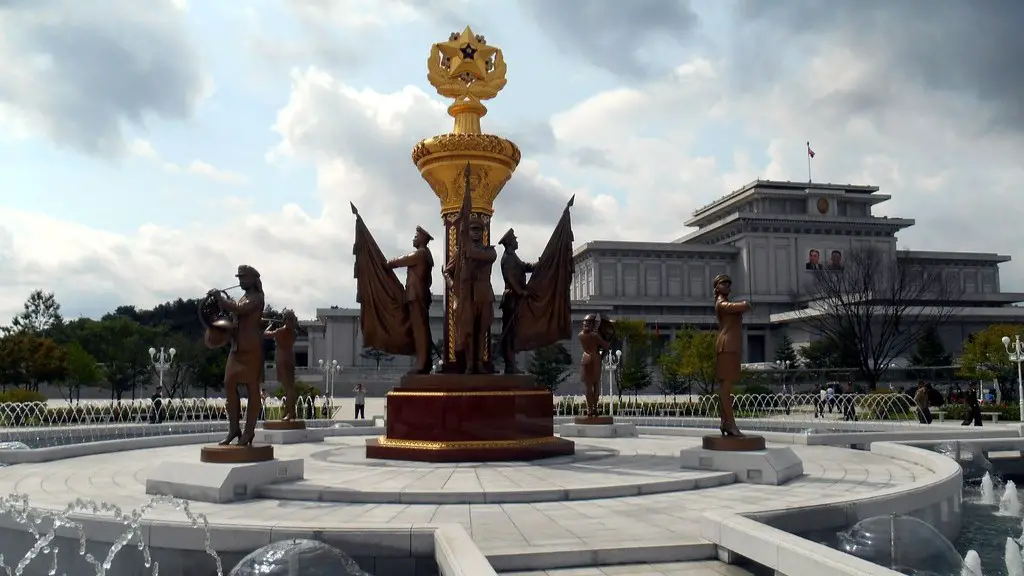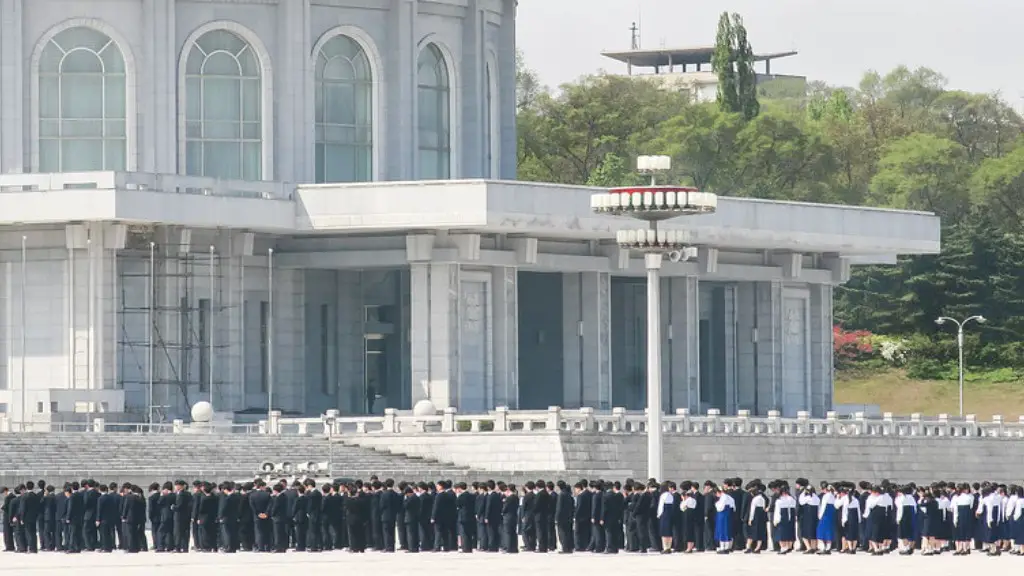Political Reasons
North Korea and South Korea have been divided since 1945, with both countries having different political systems and philosophies. In North Korea, the government is authoritarian and strictly regulates access to information, the free press and free thought for the population. North Koreans are required to revere the leader of the state and promote North Korea’s national ideology of juche, which is based on self reliance and independence from outside influence. In stark contrast to North Korea’s system of government, South Korea is an increasingly prosperous democracy that upholds universal freedoms for its population. Its citizens are free to choose their own religion, express themselves freely and practice their own political beliefs. It is this socioeconomic gulf between the two countries which is the primary reason why North Korea doesn’t like South Korea.
In addition to their contrasting political systems and beliefs, the governments of both countries have a long and hostile history. Tensions between the two countries can be traced back to the Korean War, which began in 1950 and only ended in 1953 with a truce agreement. Since then, the countries have been locked in a conflict that shows no sign of ending, with the North Korean government accusing the South of attempting to destabilise the region and of being part of a US-led imperialistic agenda. North Korea’s unwillingness to accept South Korea’s liberalisation and democracy make it impossible for the two countries to reconcile and forge friendly relations.
Economic Reasons
The South Korean economy is one of the most powerful and competitive in the world, with a gross domestic product (GDP) of more than $2 trillion in 2020. South Korea is one of the most innovative nations on the planet and its technology sector is renowned the world over. In contrast, North Korea’s GDP is tiny in comparison, estimated to be less than $30 billion in 2020. This economic disparity between the two countries has created further division and animosity between them as North Korea perceives South Korea’s economic success as a direct threat to its own security. North Korea sees South Korea’s advances in technology and wealth as a sign of its own backwardness and thus actively seeks ways to counteract it.
The economic conditions of the two countries are further exacerbated by their different approaches to international trade and market access. South Korea has embraced the global economy and has signed free trade agreements with a range of countries, fuelling its export-led economic growth. North Korea, on the other hand, has largely isolated itself from the global economy, preferring to engage in barter trade with its few trusted trading partners. As a result, North Korea has not only been left behind in terms of economic development but also in terms of technological progress.
Social Reasons
Social differences are another source of tension between North Korea and South Korea. The South has an educated and relatively affluent population who are increasingly exposed to international culture. South Koreans enjoy a high level lifestyle and can access many of the latest technological advances that have been developed around the world. In contrast, the North Korean population are mostly isolated from the rest of the world and lack access to much of the latest technology, entertainment, and lifestyle forms that are becoming prevalent elsewhere.
The two populations have also become increasingly distanced from each other, especially as North Korea has become much more closed off and secretive in recent years. Many North Koreans, who weren’t even born during the Korean War, view South Koreans as ‘foreigners’ with whom there can be no form of reconciliation or friendship. South Koreans on the other hand, can travel freely and widely around the world and are friends with people from many different cultures and backgrounds. This has made it even more difficult for North and South Korea to find common ground.
Cultural Reasons
North and South Korea are part of a unified Korean culture and share many of the same traditions, such as the language and food. However, differences in culture have become increasingly apparent as the two nations have grown apart. North Korea has been largely influenced by Chinese culture and politics, which is reflected in its art, music and cinema. South Korea, on the other hand, has been heavily influenced by Western culture and has embraced modernity.
The differences in culture have caused further rift between the two countries as North Korean authorities believe that South Korean culture undermines the core values that they strive to maintain. The South Korean entertainment industry in particular has been targeted as a source of cultural contamination, with the North Korean government increasingly seeking to restrict the flow of information and media from the South.
Military Reasons
Since the Korean War, North Korea has maintained one of the largest standing military forces in the world. It views the military as a key pillar of the state and has invested heavily in the development of its armed forces over the decades. In contrast, South Korea has sought to develop a limited self-defense capability in order to deter any attack from the North. South Korea’s military is significantly smaller and less well-equipped than North Korea’s and thus unable to counter any potential aggression from the North.
The North Korean military also operates a large network of missile bases and provides financial assistance to rogue states and insurgent groups. North Korea also appears to be in possession of weapons of mass destruction, including nuclear weapons, which pose an ongoing threat to the region. This has made South Korea and its allies increasingly wary of North Korea’s intentions and provoked an ever-increasing cycle of hostility between the two countries.
Foreign Policy Reasons
One of the key sources of tension between North and South Korea is their opposing foreign policies. South Korea has generally sought to align itself with its allies in the West and has signed a number of international agreements aimed at promoting peace and stability in the region. North Korea, on the other hand, has remained largely isolated from the international community and has been highly critical of the US and its allies.
The North Korean government also openly opposes any kind of reconciliation or dialogue with South Korea and has, on many occasions, refused to engage in bilateral negotiations with the South. This has made it increasingly difficult for the two countries to reach a peaceful resolution to their conflicts and has perpetuated the cycle of animosity between them.
Historical Reasons
North Korea and South Korea were divided as a result of the Soviet Union’s post-World War II expansion in 1945, with the two countries having adopted different forms of government since. This division has left a legacy of deep mistrust and animosity between them, which has only been exacerbated by the Korean War and the subsequent decades of military threats and propaganda.
Both countries have vastly different histories and interpretations of the same events, making it difficult for them to find common ground. North Korea views the South as a pawn of Western imperialism and accuses the US of attempting to destabilise the region. Conversely, South Korea views North Korea as a rogue state and accuses it of attempting to dominate the Korean Peninsula and its neighbouring countries.
Geographical Reasons
The geographical division of the Korean Peninsula is one of the primary sources of tension between North and South Korea. South Korea is located in the southern part of the peninsula, and North Korea is located in the north. This physical cataclysm between the two countries has contributed to an increase in hostile rhetoric and harsh diplomatic measures taken by both nations.
The fact that the South is located closer to Japan, a major US ally, is especially concerning to the North Korean government, as they believe that the US could potentially use this geographic advantage to involve itself and its allies in a conflict with North Korea. South Korea’s close proximity to Japan has also been cited as one of the key reasons why the US is increasingly supportive of South Korea and has offered it economic and military aid.


